When you travel to a new location and open yourself up to new experiences, you should also expect to encounter a slew of new feelings. Chief among them is the “culture shock.” With culture shock, the world as you know it shifts, tips on its axis, and gives way to a whole new conception of the world—even redefining what it means to live as a human being.


Travel not only offers new and exciting sights but new perspectives as well. Whether you’re trying out exotic food in a different country or experiencing different modes of living, culture shock takes most people completely by surprise each and every time. Here are some examples of unexpected culture shock that people have shared via social media.
Elephant Crossing
Traveling this world of ours can leave you feeling like you were born yesterday. People are often culture-shocked by traffic in Southeast Asian countries as there are few laws and restrictions for driving. For example, people are often seen riding without helmets, and you might see a family of five all sharing the same scooter on their way home.
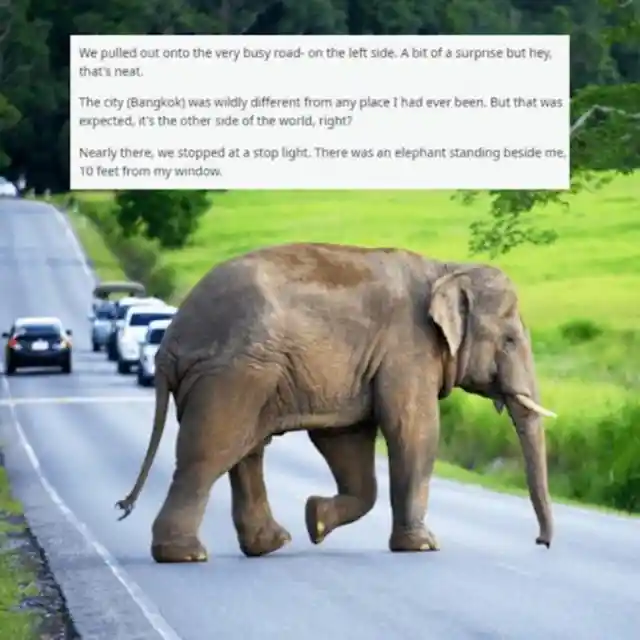
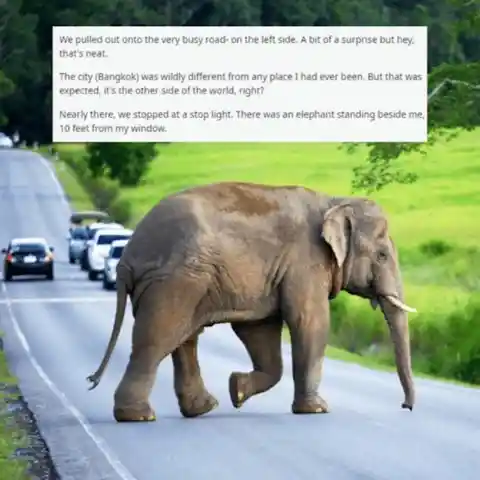
This 15-year-old saw something unusual while in Thailand. While on their way to Bangkok, an elephant appeared next to the car on the same crowded road they were traveling on. It must have been quite a sight, seeing an elephant just crossing the street like that.
Love Is In The Air
Everyone's tolerance and expectations of affection are different. Depending on your upbringing and culture, receiving affection from others may or may not be a regular day-to-day occurrence. Regardless of where you come from, you may feel culture-shocked when you travel to a place where affection is openly displayed.


France is sometimes referred to as "the country of love," so it's no wonder that public displays of affection are common there! Expect lots of kissing, embracing, and loving in public, especially if you come from a conservative country or family.
Head, Shoulders, And The Rest
Advertising is used to instill the desire for a product or service in the mind of consumers. Advertisers have and always will use any method available to them to persuade you to buy their product. Advertising content varies by country, just as their customs and norms do.


France is well-known for its appreciation of art, love, and free expression. When a commercial interrupted a show, this Californian tourist was culture-shocked. The commercial featured a topless woman advertising hair products! It makes sense since most people tend to shower in the nude. It seems that some countries are less afraid of women’s bodies than others.
Lunch on the Go
Fast food might be the first thing that springs to mind when you think of dining on the go—driving through a drive-thru or grabbing a microwavable meal from a convenience store. Vending machines occasionally stock packaged snacks or drinks. Takeaway food looks different in each country.
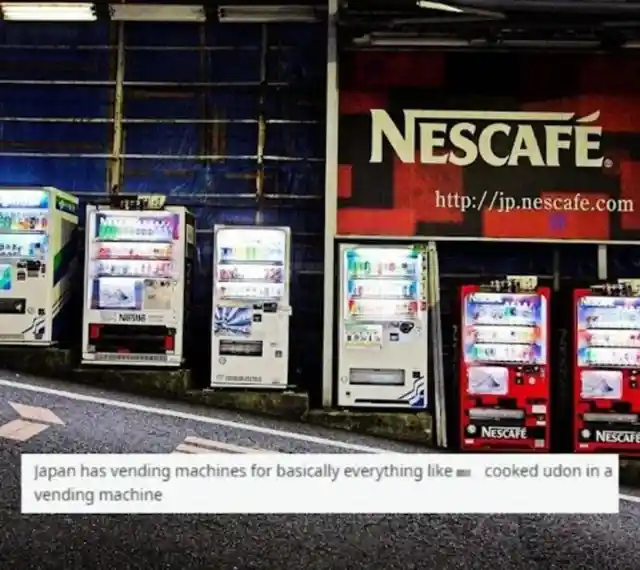
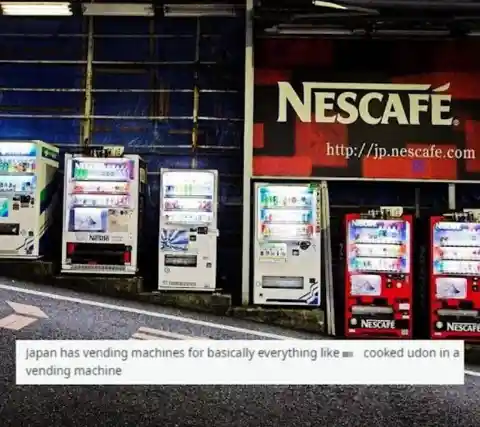
In Japan, one visitor was culture-shocked by a popular fast-food chain. Various meal alternatives were available in the vending machines—not boxed nibbles, but actually cooked meals. They even found fried Udon in a vending machine! What a great option for a quick lunch.
Unnecessary Waste
Storing and distributing food properly without making waste has become a hot topic over the last couple of years. Oftentimes supermarkets and other food sellers will throw out perfectly good food because the sell-by-date is coming up, often leaving it to rot needlessly right behind the store.
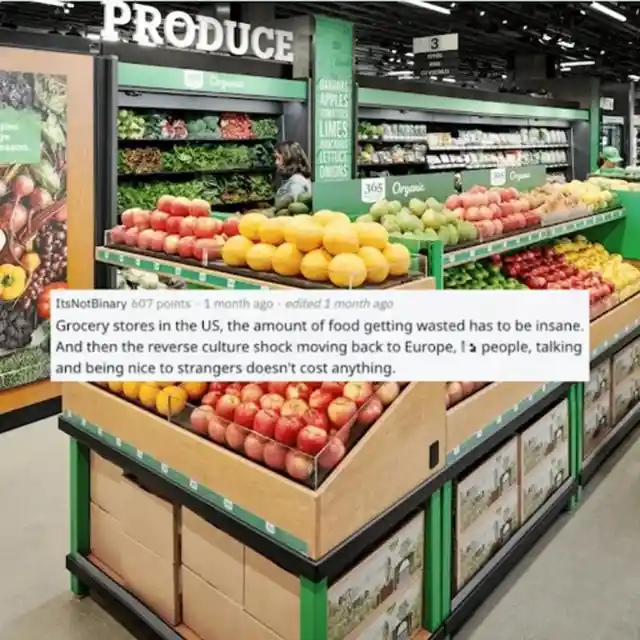
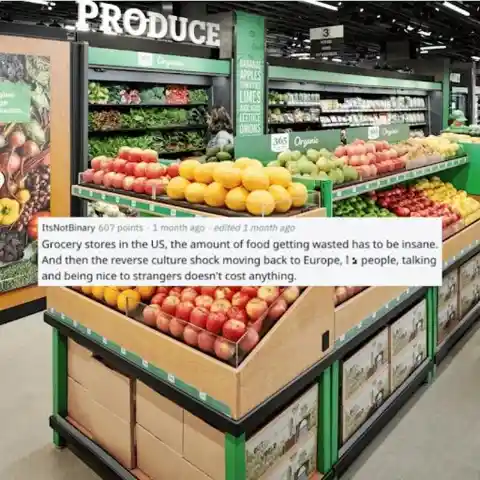
Visiting a grocery shop in the United States for the first time might be a culture shock for visitors from other countries. They sometimes comment that American stores house way too much food and lament that a lot of it simply goes to waste.
Water Conservation
In many ways, the USA is unlike most other countries. It was shaped differently than other cultures of the world. Most notably, the US was able to utilize technology to get around scarcity problems, such as traversing long distances and water sourcing. In other countries, at least in the past, sustainable techniques and waste reduction were baked into their cultures.


Because of their limited water availability, many nations have developed water conservation policies. The United States wastes a lot of water and food, but perhaps they can learn from more efficient and sustainable countries; otherwise, we’ll have to look forward to water rationing in the near future.
Language Barrier
Depending on where you are in the world, even the same words can mean different things—and that goes for acronyms, too. "lol," and "kk" are examples of common acronyms. You'd most likely use "kk" in a message to imply "okay" or "agreed" in the US.


Apparently, the "kk" abbreviation has a completely different meaning in some countries. In Africa, when responding to something hilarious or a joke, the acronym "kk" expresses the same emotion as "lol." If you say it out loud, it sounds like you’re cracking up. Kk!
With Open Arms
When traveling abroad, it's usually the small things that surprise you. Depending on the country, locals can welcome foreigners with warmth and embrace their arrival with open arms, showing kindness in unexpected and surprising ways. But shock can come in even simpler ways for some.


If you weren't raised in that kind of culture, you might be surprised by how affectionate some people in the world can be. Some cultures actively encourage the kissing or hugging of strangers! One traveler was confused by their first hug. Some find it emotionally draining. But, it can also be incredibly rewarding if you embrace it.
Car Culture
Many people outside of the United States, especially in Europe and Asia, use public transportation—bicycles, trains, or their own two feet—to get around. It’s not as common for people to drive themselves to the grocery store, the park, or work. Many people go without driving their whole lives because they do not have the need to do so.
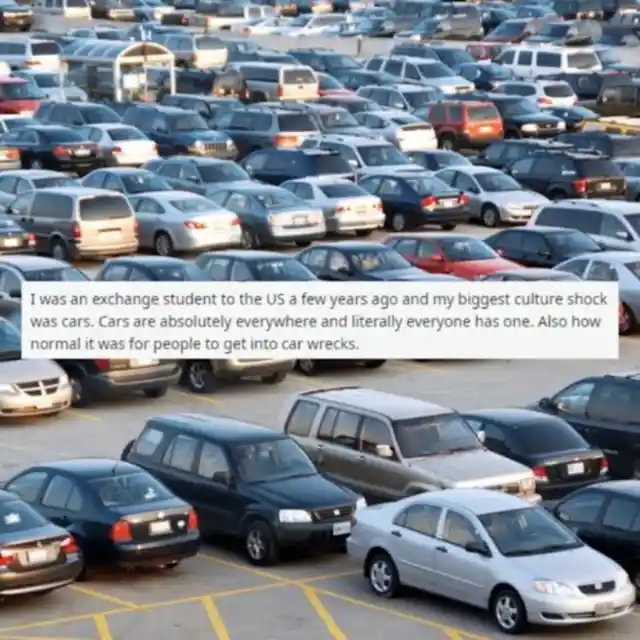

This exchange student was culture-shocked by the abundance of cars in America. In the US, everyone drives one, and everyone owns one. Some families have multiple vehicles in the garage. Unfortunately, because public transportation was thrown out in favor of highway construction, and since public policy tends to be car-oriented, owning a car is just a necessity.
Pet Shops
You might be surprised to hear that in many countries, dogs are not considered pets. In some places in the world, it is more common to see them on the streets than in homes. In a few places, they are even eaten, though this trend is becoming less popular with time.


When a Nigerian visited the United States, he was surprised to discover that Americans had many shops and products just for pets. According to him, dogs typically roam wild in Nigeria. In some cultures, treating a dog to such a lavish lifestyle is an absurdity.
Parenting Styles
Every family raises their children differently. Parenting styles vary considerably between countries. It seems that Southeast Asian households are more likely to be community-based than their western counterparts. Grandparents help raise the children in these households, and the entire family spends a lot of time together.


Western families tend to be more self-reliant and individualistic. Family members often reside in separate homes or even different parts of the country. You might be shocked when visiting a foreign country or living with a local family. You'll notice a lot of changes around the house.
Getting A Handle On Things
When traveling, you may find that living spaces differ widely depending on income, style, family size, and even on the local weather. However, when it comes to the design of homes, you may be surprised to find how much diversity there is in technology, from plug outlets to light switches.


That goes for the most basic technology, too: doors. Apparently, Europe tends to have door handles instead of knobs. This traveler was amazed by the overabundance of doorknobs here in the US. It’s true, though—handles are much more convenient than knobs when trying to open a door with your hands full!
Push And Pull
Respecting personal space is probably a given if you're from the west. In general, people try to avoid touching each other. Any kind of accidental physical contact is usually followed by an embarrassed apology or at least some kind of sheepish acknowledgment.


In many places of the world, getting shoved or bumped into is as commonplace as it gets. Americans and Canadians might be bewildered and unsettled by this if it happened to them for the first time. Keep in mind that personal space is regarded differently in other countries, and try not to take offense.
Bad Habits
The US is a great country, but there’s still plenty of work to be done. One of the best things that travel can do for people is put their old world in perspective. This traveler had what’s sometimes called “reverse culture shock” upon returning home.


Competition is a fine thing. It encourages individuals to better themselves for the good of society. But as well as producing winners, competition also creates losers, as well as rifts in the community. Perhaps it’s time to examine this part of our culture.
It’s All About The Money
In many cultures, the discussion of money and income is frowned upon. In these places, talking about your financial situation with a stranger might be nerve-wracking. In others, money is just another topic of conversation. Cultural shock may occur when talking to locals who might casually inquire about your income.
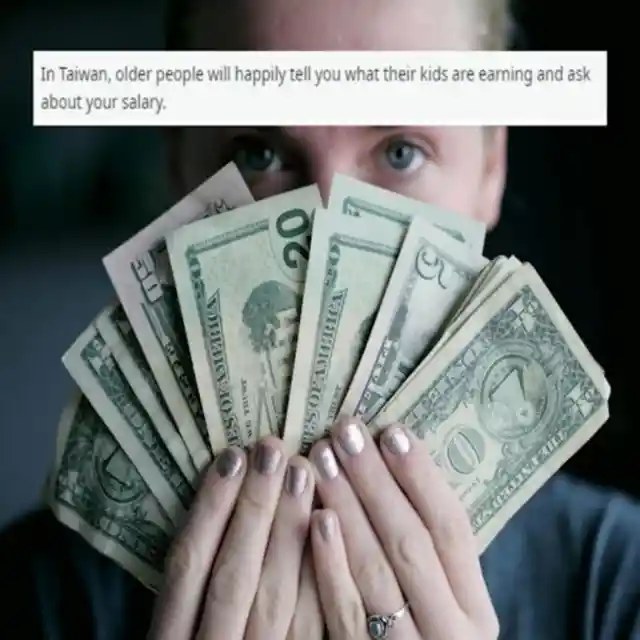
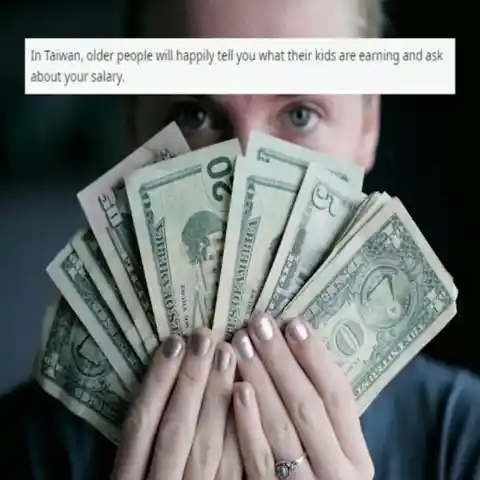
A person's comfort level when discussing money might also depend on their age. According to this traveler's observations, the older generations in Taiwan believe that discussing the incomes of their children is a trivial thing, at least on the face of it.
Free Birds
Animals can signify good or bad omens in some cultures. Other cultures see animals purely as pets or family and, as such, can be viewed as both a source of comfort or irritation. In some places, you may experience culture shock due to the way that animals are treated there.


A Canadian working in New Zealand was surprised at the airport. Everyone seemed unconcerned as birds flew around inside the terminal. In Canada, he said, birds can scare people and are usually escorted outside by animal control authorities.
Lizard Land
You'll have exotic encounters with people and animals when you go abroad, although not always in the way you expect. For example, if you're used to seeing squirrels in your hometown, you might be shocked to see them in green and covered in scales elsewhere.


As a tropical island, Puerto Rico is home to various creatures, including rare insects and reptiles. This honeymoon couple traveled to Puerto Rico, where iguanas were as commonplace as squirrels! We hope they didn’t try to feed them nuts, though.
Bean There, Done That
Consider the products you buy and use frequently. What do your regular meals consist of? Your answer will undoubtedly differ depending on your country of origin. Traveling can cause considerable food culture shock whether you eat out, stroll by street food stalls, or go to the supermarket for snacks.
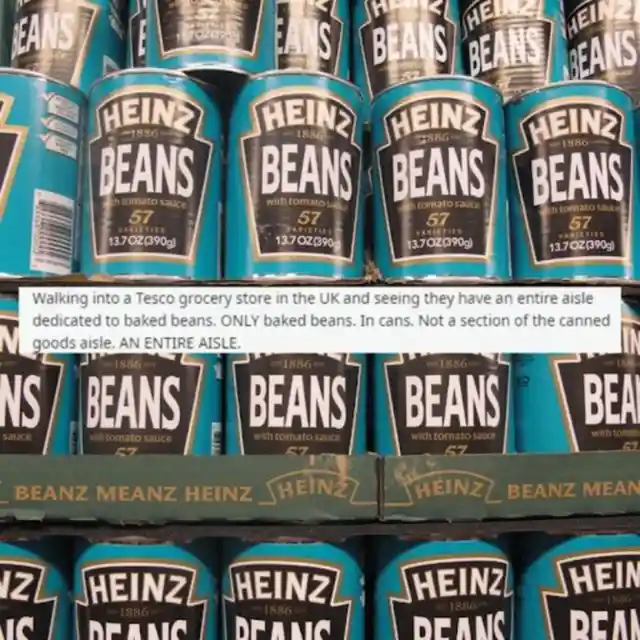

An American visitor went to the UK and shopped at a Tesco food store. They were startled to find an entire section allocated to baked beans! There would probably be many types of beans on offer in the U. S., not just one. It's always interesting to discover what foods are popular in foreign countries.
New Dishes
In all likelihood, you probably haven't even tasted all the cuisine on offer in your own country. Even between people within a country, food preferences tend to differ widely. Here’s an example of a culture shock coming from a place that should be familiar.


That’s right. Even in your own country, you may feel some form of cultural shock. This Canadian moved from Toronto to a different part of the country. When they arrived, the store owner suggested that they try a local Donaire meal with homemade sauce. Needless to say, they were unimpressed with the dish.
Surprisingly Cheesy
Food is one of the biggest shockers when traveling to a foreign country. As well as being overwhelmed by the change of temperature, noise levels, personal space policies, and scents, your brain will be working hard to break down all the new taste associations you’re making.


An American decided to treat their Australian friend to a meal. A common American appetizer, mozzarella sticks, surprised the Australian guest, presumably with its elegant simplicity and nuanced flavors. Don’t judge a book by its cover!
Go Big Or Go Home
When you spend your entire life in the same place, you may not know that there is such a thing as another "normal." However, you may find that, once you return home after being away from home so long, normal looks anything but.
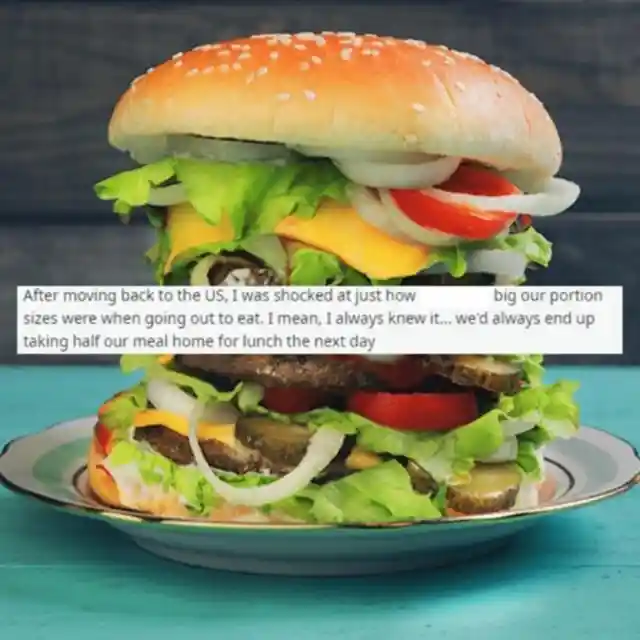
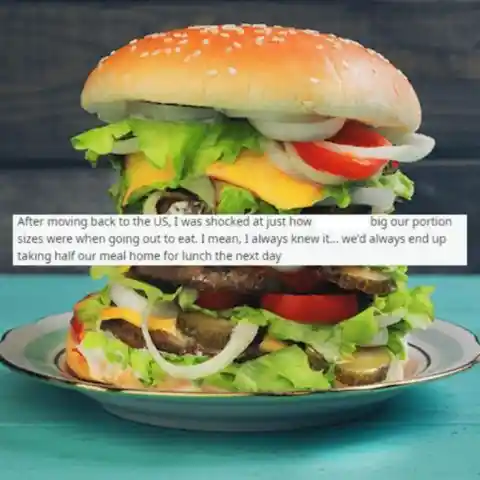
A worker from the United States relocated to the Netherlands. When they returned, they were shocked at how drastically different the two countries were when it came to portion sizes. At least our meals are good for leftovers.
Hot or Cold
Tea or coffee can be drunk hot or cold. Most drinks in the west are considered good only when chilled. When it comes to water, it all depends on which part of the world you’re in. Water can be served at room temperature or, in some cases, warm. You might be surprised to learn that most countries prefer their water hot.


When you request water, you may be given something different than what you expected. For example, Chinese people traditionally drank hot water with their meals. Luckily, chilled bottled water is never too far away if you’re in a busy city.
Feeling Dizzy?
Life is like a box of chocolate. They’re built differently in every country. In Mexico, people prefer sweet treats with an extra kick of spice. In Scotland, they like to deep-fry their Mars Bars. Here’s a good example as to why you should check what your kids are eating if you go abroad.


Sweets are a staple of childhood, but probably not alcoholic sweets. Kids have a tendency to act weird on their own, so maybe this person’s parents simply didn’t notice. Let’s just hope that their parents also taught them not to eat all the candy in a box at once.
Shopping Spree
Culture shock doesn’t always have to come from going abroad or meeting foreigners. Unfortunately, sometimes culture shock can come from meeting people from within your own country who operate in different economic circles than the rest of us.


Maybe this friend came from Ireland since that’s where the tech giant seems to make most of its money these days—despite not actually having any employees there. In any case, here’s an example of a person encountering a lucky individual who, unlike most of us, doesn’t need to keep a budget or account for prices in a supermarket, thanks to her parents.
Tax Excluded
Taxes are one of the few things in life that you cannot avoid—unless you’re successful enough to move your company’s tax residency into a tax haven, like Cyprus or Ireland—but for individuals, everything is taxed, including any goods you buy.


Most stores outside the US will include the tax price on items. But in the US, store owners will add the price only after their customer arrives at the checkout, as this Australian visitor was shocked to find when they discovered that the items they wanted didn't include taxes on the tag.
B’ready
The food industry has seen changes in many developed countries throughout the world. Most food products nowadays are mass-produced, replacing the handmade food made by local commodities. Even vegetables and bread are becoming ultra-processed and less nutritious.


A German living in America went to Wal-Mart. They were stunned by the sight of all the packaged, white sliced bread. Despite the amount of choice on offer, the bread was all low quality. We think it’s a shame as many small companies in the US, many of them bakeries who produce quality goods, still struggle to compete with large manufacturers.
Pro Tips
Although it wasn’t always this way, tipping is ubiquitous in the United States. It would be rude not to tip—after all, your waiter or waitress probably doesn’t make enough to eat on the money the restaurant or diner provides. However, in some parts of the world, tipping is considered unusual or even offensive.


Leaving a tip is supposed to indicate that the service or food was excellent. This person was culture-shocked by the habit of tipping the server regardless of service quality. Tipping is customary in the US as it provides income for restaurant employees.
Card Over Cards
To foreigners, the fact that Americans favor credit cards over cash may come as a cultural shock. Unlike cards, cash allows you to see how much money is going out on a moment-to-moment basis. Cash is also generally accepted just about anywhere, unlike cards.
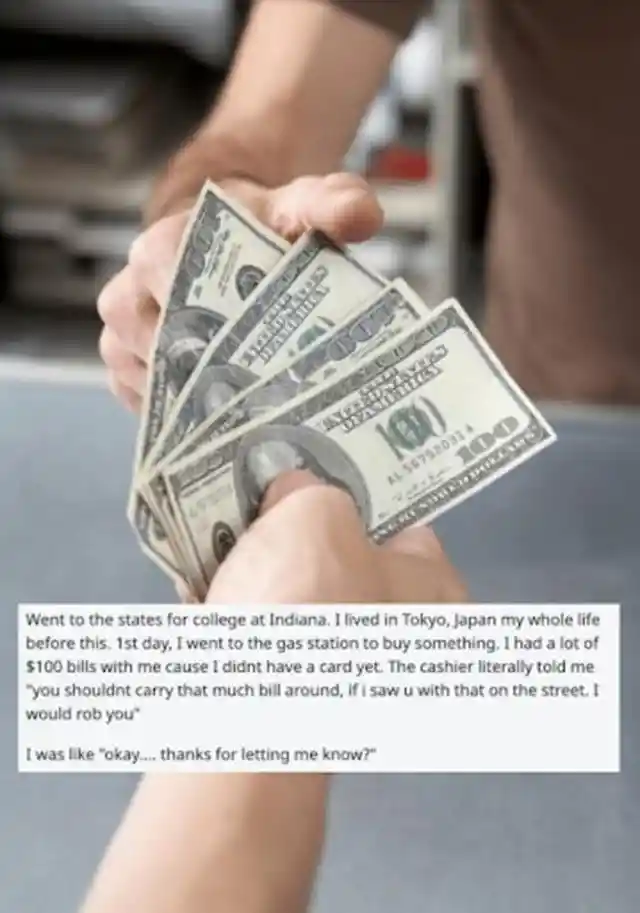
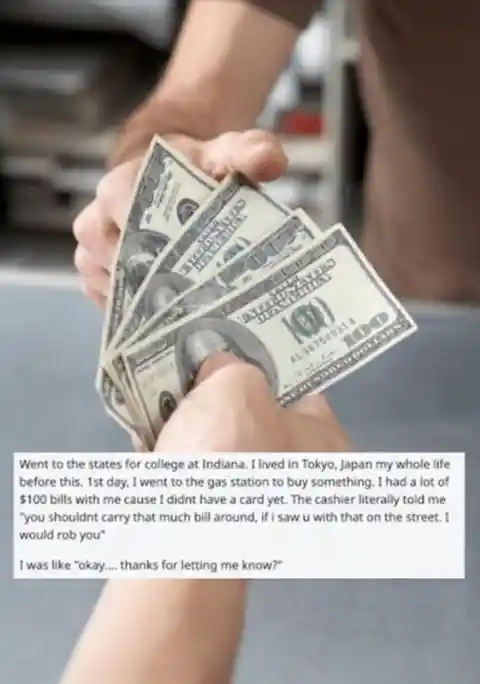
Cash is still the most popular way to exchange money in Japan and Southeast Asia. This Japanese student learned firsthand why most Americans prefer to carry cards over bills—it’s not safe to carry your money around. Perhaps it’s a different story in Japan.
Drive-Thrus
The United States has a reputation of being a place that prioritizes the comfort and accessibility of its citizens. Despite this, everyone seems to be in a rush. To remedy this and to circumvent long lines and wait times, they invented the Drive-Thru!


America initially created drive-thrus for food, then banks and beverages got in on the fun. One tourist was taken aback by the number of drive-thru alternatives available. Many countries don't even have a system like this in place, even for burgers. Some countries don’t even have burgers!
Asking For Directions
Traveling can be a joy, but it can also feel overwhelming, especially when you’re new to a place. This is especially true while trying to get directions. Some people use head nods to point the way, while others use full-body signals or even their feet.


A traveler in Malaysia noticed a small difference in the way directions are given. Malaysians often indicate where to sign your name or which way to go with their thumbs. To the traveler, this was strange, presumably because they used their index finger for this kind of job.
Bathroom Habits
Most western cultures use toilet wipes to clean up in the restroom. Travelers visiting a country without toilet paper may experience culture shock. In some cases, you'll need to bring your own to feel hygienic; otherwise, you’ll have to find another way.


Some countries use bidets, a water spray, to help clean up after finishing up with business. Bidets have long been the norm in countries that don't use toilet paper. However, bidets are becoming more popular in areas where toilet tissue is scarce.
Aren't You Getting Hot?
People who live in hotter climates tend to act as if it isn't that hot outside, even if, to you, the whole world is on fire. For travelers, hot weather can be stressful and uncomfortable. Trying to blend in isn’t worth it if you’re suffering. Go in a T-shirt and shorts if you can.
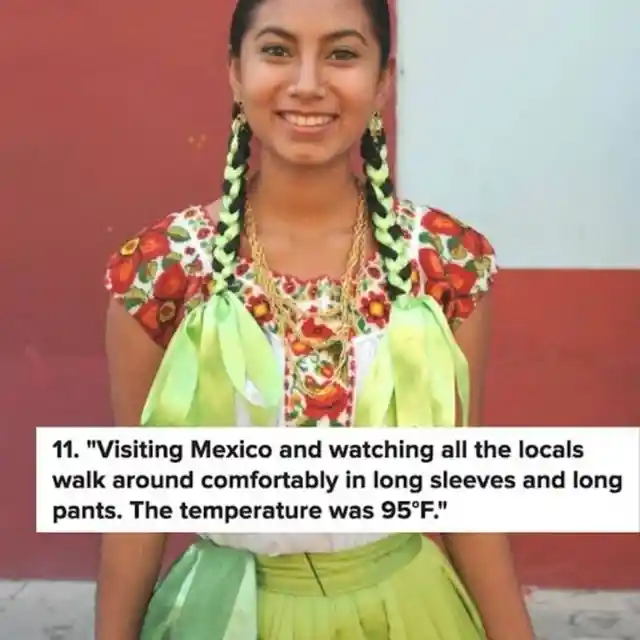
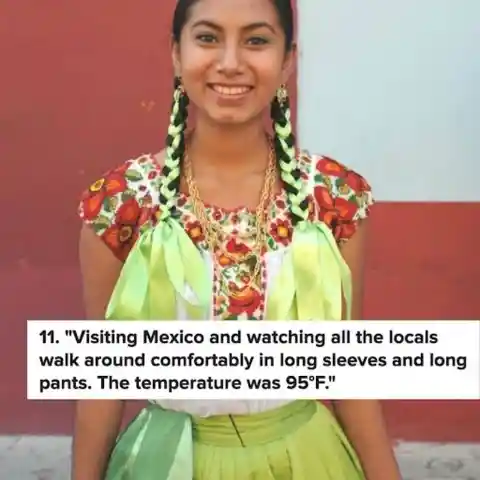
In Mexico, people tend to cover up regardless of the heat. Travelers noticed that the natives didn't mind the scorching weather and wore long sleeves and pants as if it were cool. If you're from a hot place, you're usually used to it.
Sightseeing
Sightseeing in a new place is a terrific way to broaden your horizon. Culture shock can be tough, but it can also be exciting and will lead to many valuable memories. A national park, a monument, a beach, a city—these are all places that can steal your breath away.


A traveler in Sri Lanka was culture-shocked by these animals. They were probably used to seeing cows and other agricultural animals on farms and fields. Cows in Sri Lanka seem to roam pretty freely. They spotted them lazing on the sand by the beach.
New Pals
The idea of meeting new people might be scary when you are in an unfamiliar environment. It is much easier to establish a relationship and feel welcomed when the people of another country greet you with open arms. Meeting new people can teach you so much!


While Americans are notorious for their “small talk,” they are also considered to be highly sociable. The friendliness of Americans surprised this traveler. It seems that their warmth made a lasting impression on him.
Getting Used to the Weather
Like cuisine, the weather may be a big shock for travelers. If you are from a chilly country and you visit a warm country, you will likely enjoy the weather. Don’t be surprised if you see the locals clothed in much warmer clothes despite the sunny weather.
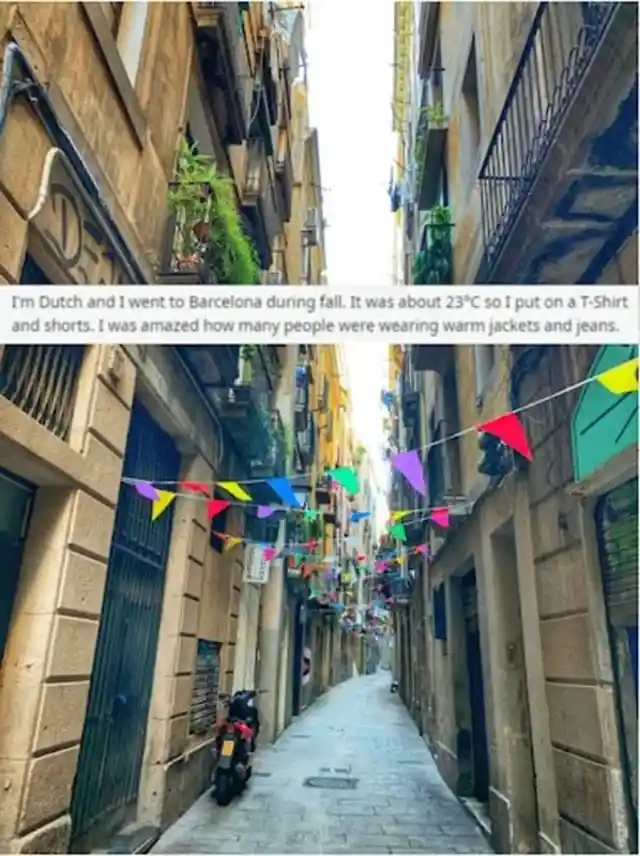
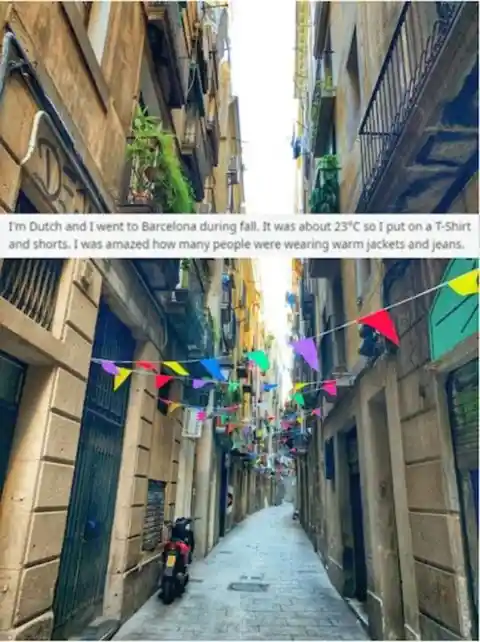
Barcelona is a top autumn vacation spot for Dutch holidaymakers due to its great weather. One Dutch traveler was enjoying the warm weather in shorts and a T-shirt. However, he was startled to see locals wearing jackets and long pants.
The Blind Community
Different societies regard the elderly and the disabled differently. Not every country has enough wealth to lay down the infrastructure needed to accommodate differently-abled people. Regardless of the country, communities often spring up which cater to people of these groups.
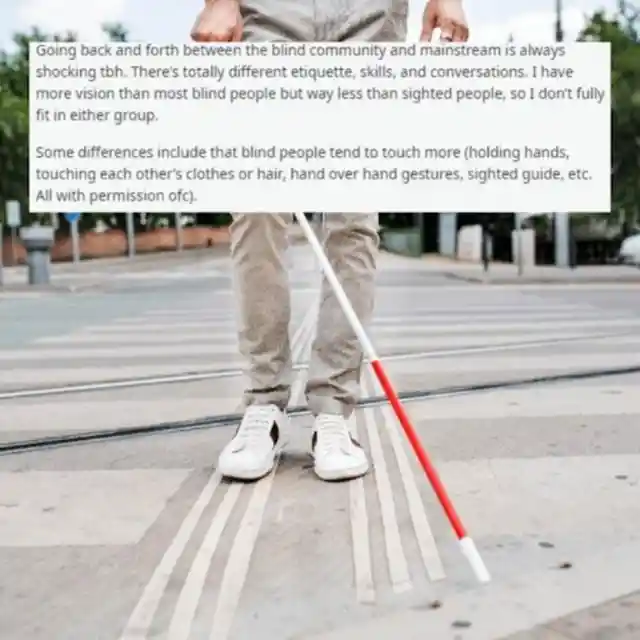
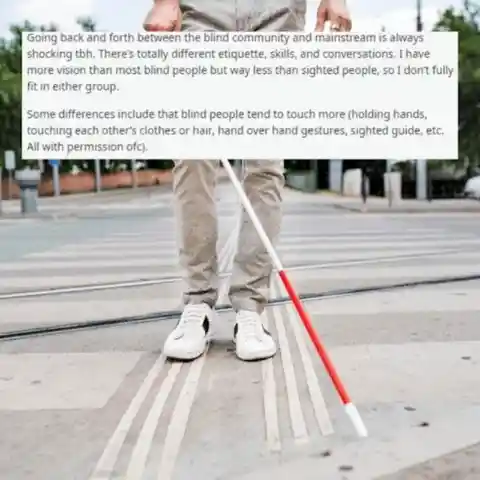
Culture shock can occur in and out of these communities. Different needs produce different customs and cultures, and the blind community is no exception. For example, they may want to touch your face or hands during a conversation to get a feel for how you look.
Time For A Nap
No matter where you were raised, every kid racks up considerable nap time growing up. After a long day, many adults will miss those heady days. Afternoon naps, or "siestas," are common in some countries and are even observed as common practice in some workplaces.


This Irish woman became an au pair for a Spanish family in France. She was culture-shocked on her first day when the family all immediately took a nap after lunch. After nap time, the mother woke everyone up, including the nanny, who was presumably still perplexed.
Workplace Culture
Although it is never quite as storied or profound, workplace culture can be as varied as any country. Offices and workplaces are supposed to be designed to foster creativity and teamwork. Unfortunately, it doesn't always work out that way.


The work environment at this office stunned one employee upon starting his new job. It was full of cliques and people who didn't want to work together. This type of work environment seems to impede progress. Staying in a negative situation may not be worth it for your mental well-being.
Unexpectedly Big
You've probably been to a new location and thought, "Wow! Everything looks so big." Maybe not so if you came from a huge metropolis or a first-world country. So, when you travel to a new place, you may get culture-shocked.


A Dutchman visiting Canada was culture-shocked by the country and the city’s scale. Everything was far bigger than he expected! It's the norm in most major cities. Everything in Canada is bigger—from structures to restaurants to vehicles.
Natural Occurrences
Count your blessings if you have never encountered a natural disaster before! If you intend to relocate to a new country, do your homework to ensure you are properly equipped for such a situation, or else you might receive a little more than just a cultural shock.
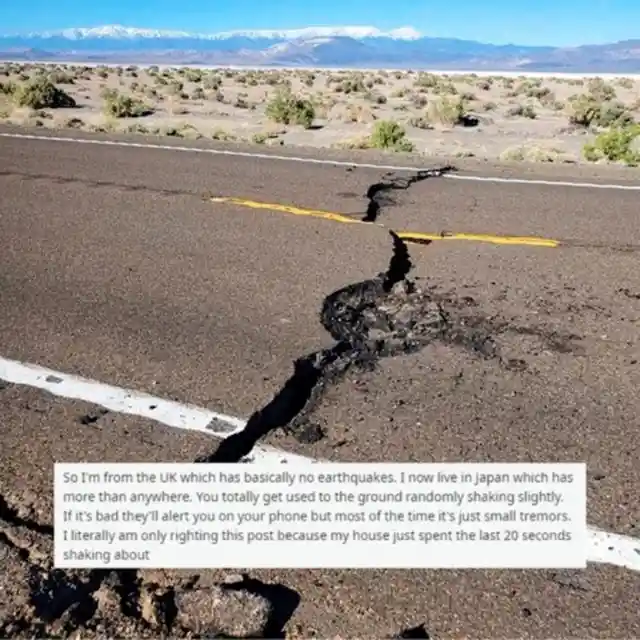
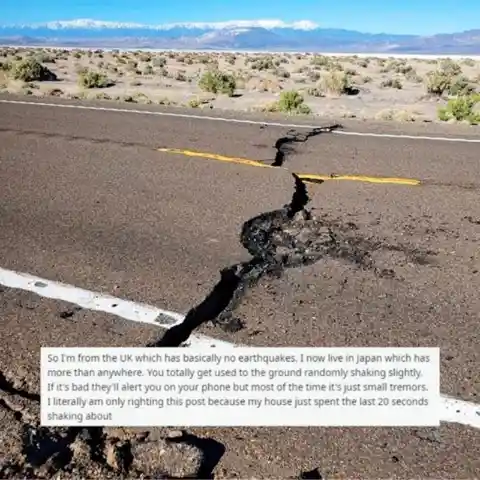
This UK native had never felt an earthquake before. However, after relocating to Japan, this definitely changed. As Japan is on a fault line, earthquakes are a common occurrence. Fortunately, most earthquakes are minor shocks. However, it was a big culture shock to them.